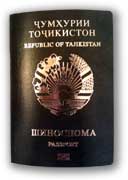Wednesday 1 August 2012
Moscow Sends 200 Russian Language Teachers to Tajikistan
Keywords:
DUSHANBE (Asia-Plus) – Russia is sending 200 Russian-language teachers to Tajikistan’s northern province of Sughd (سغد), Asia-Plus reports.

- Biometric Tajik passport covers are black with the words Republic of Tajikistan inscribed on top of the booklet in Tajik language (i.e. Persian written in Cyrillic) and also inscribed in English at the bottom. The Tajik coat of arms is emblazoned in the centre of the cover page, followed on the bottom by the inscription of the word Passport in Tajik and English.
Sughd’s regional education department head, Saidmukhtor Jalolov (سعیدمختار جلالوف), said on July 31 that the Russian teachers will arrive in Tajikistan to teach local children, in accordance with a bilateral agreement signed by the two countries’ education ministries earlier. Local authorities will provide the teachers with accommodation.
President Vladimir Putin decreed 2007 as The Year of the Russian Language. The declaration was not merely ceremonial – the number of Russian speakers has declined annually since the collapse of the Soviet Union. Today, the official and vernacular language of Tajikistan is Persian written with a variant of Cyrillic alphabet. The use of Russian in official documents has been ruled out in 2009 although the Constitution still mentions it as the “language for inter-ethnic communication”. Older generations often associate Russian with compulsory lessons under communism, nevertheless, Russian is routinely used in business and communication.
Furthermore, employment opportunities could maintain interest in “Dostoyevsky’s language”. On July 31, the first language test centre in Russia was opened in St. Petersburg. The head of Russia’s Federal Migration Service, Konstantin Romodanovsky, said that labour migrants involved in the service and catering industries in Russia will be obliged to pass a Russian language test to be eligible to obtain a work permit.
In recent years, tougher immigration regulations, hostility toward migrants, and economic decline have affected migration patterns. As an emerging market, Russia draws migrant workers because of their physical and cultural proximity. The Russian economy is approaching 8% annual growth, making it a beacon for migrants with the financial means and language abilities to work there.

